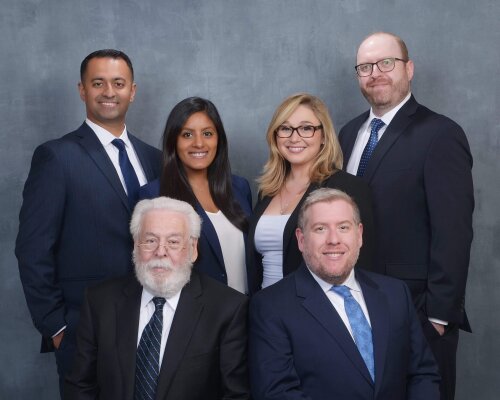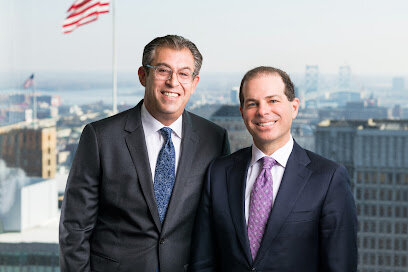Best Drugs & Medical Devices Lawyers in Philadelphia
Share your needs with us, get contacted by law firms.
Free. Takes 2 min.
List of the best lawyers in Philadelphia, United States
About Drugs & Medical Devices Law in Philadelphia, United States
Drugs and medical devices law covers a wide range of legal issues that affect manufacturers, health care providers, patients, pharmacies, hospitals, and distributors. In Philadelphia, these matters are shaped by a mix of federal rules, Pennsylvania state laws, and local public-health policies. Federal agencies such as the Food and Drug Administration and the Drug Enforcement Administration set overarching standards for approval, safety, marketing, controlled-substance regulation, and enforcement. State agencies and boards enforce licensing, controlled-substance distribution, prescription monitoring, and patient-safety rules. At the local level, Philadelphia public-health programs and ordinances influence access to services like syringe-exchange, naloxone distribution, and community responses to substance-use disorders.
Legal issues in this area commonly include regulatory compliance, product liability and recalls, adverse-event reporting, criminal prosecution for illegal drug distribution or diversion, civil claims for harm caused by defective drugs or devices, medical-malpractice claims related to device use or drug administration, and employment or contracting disputes arising from regulatory enforcement. Given the technical and procedural complexity of these matters, people often need specialized legal help to understand rights, obligations, and remedies.
Why You May Need a Lawyer
There are many situations in which hiring a lawyer experienced in drugs and medical devices law can be important. Examples include:
- If you are a patient harmed by a drug or implantable device and want to pursue a product liability or medical-malpractice claim.
- If you are a health care provider or pharmacist facing disciplinary action, criminal investigation, or civil liability related to prescriptions, controlled substances, or device implantation.
- If you are a manufacturer, distributor, or supplier dealing with FDA inspections, recalls, adverse-event reports, or enforcement actions.
- If you are a clinical investigator or sponsor involved in a trial and face regulatory issues, informed-consent disputes, or data-integrity concerns.
- If you receive a subpoena, government investigative notice, or civil complaint related to drug diversion, billing fraud, or False Claims Act allegations.
- If you need assistance navigating the Pennsylvania Prescription Drug Monitoring Program, opioid prescribing rules, or local public-health initiatives such as naloxone standing orders.
In each of these scenarios, a specialized lawyer helps protect legal rights, manage regulatory compliance, preserve evidence, negotiate with authorities, and pursue or defend claims effectively.
Local Laws Overview
Key legal frameworks that affect drugs and medical devices in Philadelphia include federal statutes and regulations, Pennsylvania state law, and Philadelphia-specific public-health practices:
- Federal framework: The FDA regulates drug and medical-device approval, labeling, manufacturing practices, and adverse-event reporting. The DEA enforces the federal Controlled Substances Act, including registration of practitioners, quotas, and diversion investigations. Federal civil statutes such as the False Claims Act address fraud in government-paid health programs.
- Pennsylvania statutes and rules: Pennsylvania has its own Controlled Substances Act and scheduling rules, licensing and disciplinary authority through the Pennsylvania State Board of Medicine and State Board of Pharmacy, and a statewide Prescription Drug Monitoring Program that tracks controlled-substance prescriptions. Pennsylvania law also implements medical-malpractice rules, product-liability doctrine, statutes of limitations, and patient-consent requirements. The Pennsylvania Medical Marijuana Act governs cultivation, distribution, and lawful patient access to medical cannabis under state law.
- Philadelphia local practices: The Philadelphia Department of Public Health and local harm-reduction programs influence how services are delivered in the city. Philadelphia supports syringe-lending and exchange programs, outreach for substance-use disorder treatment, naloxone distribution under standing orders, and local policies aimed at reducing overdose deaths. While local ordinances rarely override state or federal rules on drug regulation, they affect access, enforcement priorities, and public-health responses.
- Professional and institutional rules: Hospitals and health systems in Philadelphia follow federal Conditions of Participation, state licensure standards, and institutional policies that affect device selection, credentialing, adverse-event reporting, and peer-review processes. Health privacy rules under HIPAA govern handling of medical records and device-generated data, with potential enforcement by the HHS Office for Civil Rights.
Frequently Asked Questions
What is the difference between federal and Pennsylvania regulation of drugs and medical devices?
Federal regulation, led by the FDA and DEA, sets national standards for safety, approval, labeling, manufacturing, and controlled-substance scheduling and enforcement. Pennsylvania supplements federal rules with its own licensing, disciplinary procedures, prescription monitoring, and criminal statutes. Where federal preemption applies, federal law can limit state claims in some device cases, but many state tort claims and state regulatory enforcement actions remain viable.
How do I know if I have a product liability claim for a defective drug or device?
To have a product liability claim you generally must show the product was defective or unreasonably dangerous, the defect caused your injury, and you suffered damages. Defects may be design defects, manufacturing defects, or failures to warn. Medical-malpractice issues can overlap when a provider used the product in a standard way. A lawyer experienced in product liability and health-care cases can evaluate medical records, device history, and regulatory filings to determine the best claim strategy.
What should I do if I suspect adverse effects from a drug or device?
Seek prompt medical care and document symptoms and treatments. Preserve the product, packaging, implant cards, and any device identifiers. Ask for and keep copies of medical records, imaging, and operative notes. Report the adverse event to the FDA MedWatch program and to the manufacturer if possible. If you expect legal action, contact a lawyer before altering or discarding evidence and follow their instructions for preservation.
Can I be criminally charged for prescribing or dispensing controlled substances in Philadelphia?
Yes. Improper prescribing, diversion, or unauthorized distribution can lead to criminal charges under federal and state law. Pennsylvania and federal prosecutors can pursue indictments for illegal distribution or trafficking of controlled substances. Providers should follow prescribing guidelines, maintain proper records, use the state Prescription Drug Monitoring Program, and comply with DEA registration and security requirements to reduce risk.
How does the Pennsylvania Prescription Drug Monitoring Program affect patients and prescribers?
The PDMP tracks controlled-substance prescriptions and helps identify patterns of misuse or diversion. Prescribers and pharmacists use it to review a patient’s prescription history before issuing or filling controlled substances. The PDMP aims to reduce inappropriate prescribing, but it may also affect patient access to pain management. Providers must consult the PDMP in certain situations and maintain documentation of their review.
What protections exist for people who call 911 during an overdose in Philadelphia?
Pennsylvania has a Good Samaritan law that provides limited immunity from certain drug-possession charges for people who seek emergency medical help for someone experiencing an overdose. Philadelphia public-health efforts also promote naloxone availability under standing orders so laypeople and first responders can reverse overdoses. Immunity rules have limits and do not protect against all offenses, so consult an attorney about specific situations.
How are device recalls and safety notices handled?
Manufacturers notify the FDA about certain device problems and may issue recalls or corrective actions. The FDA classifies recalls by risk level and can order recalls or impose enforcement actions for significant threats. Hospitals and clinicians must follow recall notices, identify affected patients, and report adverse events. Patients injured by recalled devices may have civil claims against manufacturers, distributors, or health-care providers depending on the circumstances.
Can I bring a wrongful-death or personal-injury lawsuit related to a drug or device?
Yes. If a drug or device caused injury or death due to defect, negligence, or failure to warn, survivors or injured people may pursue civil claims under product-liability law, negligence, or wrongful-death statutes. Time limits apply under Pennsylvania statutes of limitations and discovery rules, so timely consultation with counsel is important to preserve claims and evidence.
What should health-care providers do when they get contacted by the DEA or a state investigation?
Do not respond without legal advice. Preserve all relevant records and avoid deleting files. Contact an attorney experienced in regulatory defense and health-care investigations immediately. An attorney can help manage production of documents, handle interviews, negotiate with investigators, and protect licensure rights. Early legal involvement often improves outcomes.
How do I find the right lawyer for a drugs or medical-devices issue in Philadelphia?
Look for attorneys with specific experience in FDA law, product liability, health-care regulatory work, medical malpractice, or criminal defense for controlled-substances issues, depending on your situation. Check their track record on similar cases, disciplinary history, and whether they handle cases in Philadelphia and Pennsylvania courts. Ask about fee structures, expected timelines, and initial strategies during a consultation.
Additional Resources
Key organizations and agencies that can provide information, regulatory oversight, or assistance include the following:
- U.S. Food and Drug Administration - oversees drug and medical-device approval, labeling, safety reporting, and recalls.
- Drug Enforcement Administration - enforces federal controlled-substance laws and practitioner registration rules.
- Pennsylvania Department of Health - administers public-health programs, the Prescription Drug Monitoring Program, and state medical policies.
- Pennsylvania State Board of Medicine and Pennsylvania State Board of Pharmacy - handle licensure and discipline of physicians, pharmacists, and related professionals.
- Philadelphia Department of Public Health - local public-health initiatives, harm-reduction programs, and community responses to substance-use disorders.
- U.S. Department of Health and Human Services - Office for Civil Rights - enforces HIPAA privacy and security rules for health information.
- Centers for Medicare and Medicaid Services - administers federal payment programs and rules that affect medical devices and drug reimbursement.
- Local legal aid clinics, bar-association lawyer referral services, and specialized plaintiff and defense firms - for referrals to experienced counsel.
Next Steps
If you need legal assistance related to drugs or medical devices in Philadelphia, consider these practical next steps:
- Gather and preserve documents: medical records, prescriptions, implant cards, product packaging, photographs, bills, and any communications with providers or manufacturers.
- Document timelines: dates of treatment, device implantation, onset of symptoms, reports to authorities, and contacts with manufacturers or regulators.
- Seek immediate medical attention if you are injured or at risk, and request complete copies of medical records.
- Contact an attorney with relevant experience. For personal injury or wrongful-death claims, consider lawyers who take cases on contingency. For regulatory or criminal matters, seek counsel who offers defense and investigative experience and can act quickly.
- Do not destroy evidence or provide open-ended statements to investigators without consulting your lawyer. If you are a provider, comply with mandatory reporting obligations while coordinating your response with counsel.
- Report dangerous products and adverse events to the appropriate agency, and follow public-health guidance in Philadelphia for overdose responses or device recalls.
Taking prompt, informed action preserves legal options and protects health and rights. A qualified lawyer can explain practical options, likely timelines, and realistic outcomes based on your specific situation.
Lawzana helps you find the best lawyers and law firms in Philadelphia through a curated and pre-screened list of qualified legal professionals. Our platform offers rankings and detailed profiles of attorneys and law firms, allowing you to compare based on practice areas, including Drugs & Medical Devices, experience, and client feedback.
Each profile includes a description of the firm's areas of practice, client reviews, team members and partners, year of establishment, spoken languages, office locations, contact information, social media presence, and any published articles or resources. Most firms on our platform speak English and are experienced in both local and international legal matters.
Get a quote from top-rated law firms in Philadelphia, United States — quickly, securely, and without unnecessary hassle.
Disclaimer:
The information provided on this page is for general informational purposes only and does not constitute legal advice. While we strive to ensure the accuracy and relevance of the content, legal information may change over time, and interpretations of the law can vary. You should always consult with a qualified legal professional for advice specific to your situation.
We disclaim all liability for actions taken or not taken based on the content of this page. If you believe any information is incorrect or outdated, please contact us, and we will review and update it where appropriate.












